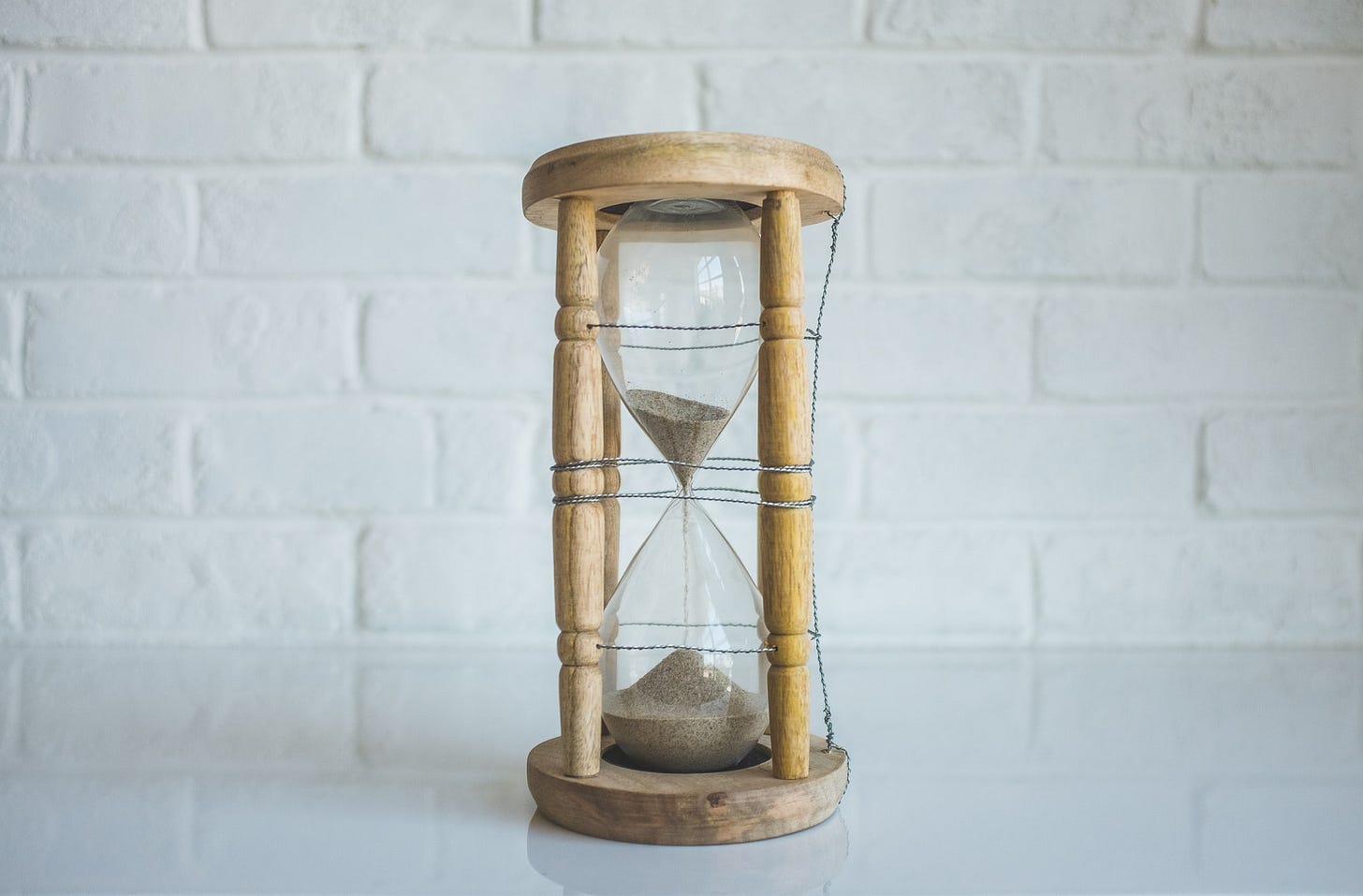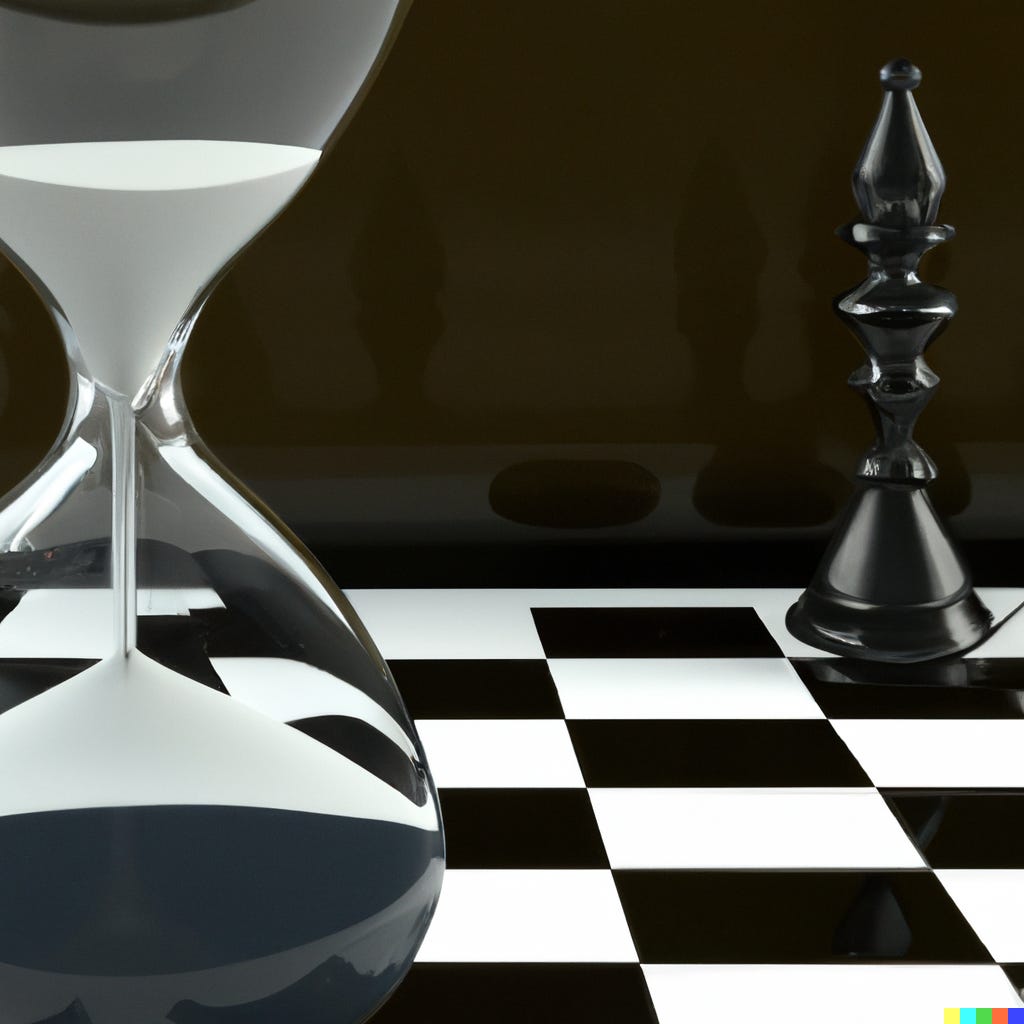In Search of Lost Time: 20 Time Trouble Tips
Do you get too low on time, too often, in your chess games?
It is always thus, impelled by a state of mind which is destined not to last, that we make our irrevocable decisions.
—from Within a Budding Grove (In Search of Lost Time, Volume 2) by Marcel Proust
There’s nothing that gets a chessplayer’s adrenaline pumping like a time scramble.
Strategic considerations and Kotov’s tree are thrown out of the window, and the game will be decided by how sharp your skills of intuition and tactics will be.
Since the age of 10, I've played hundreds of (FIDE-rated) classical games where, unfortunately, I've been down to my increment from the early middlegame.
To paraphrase a line from The Kangaroo Communique, a short story by Haruki Murakami,
I’ve experienced every and all kinds of time trouble. You could say I’m an authority on time trouble.
(A comment from a kind Chessgames.com member on my page)
My lucky highlights as a ‘time trouble addict’ are surviving against grandmasters on increment, often in lost positions, and ending up winning on time in six games.
However, I’ve lost too many painful games due to blundering in time trouble.
In the end, there’s nothing better than knowing how to handle your addiction clock so as to avoid those tense situations. But sometimes, we can’t avoid it.
Through the countless hours spent on stress level at maximum, here are 20 tips I’ve learnt.
10 tips for time trouble
Look for counterplay. Even if the chances of succeeding are low, search for targets. Rack your brains in your opponent's time as well. If your opponent, ahead on time has nothing at all to worry about with their position either, the game is going to be one-sided
Don't give up. There are many players who are unnecessarily affected by their opponent's low time and make mistakes or play sub-optimal moves. If you think there's no hope in your position, you're bound to miss opportunities that aren't obvious because you're not looking for them
Be confident in the 4th hour. If you've managed to survive for a long time on increment, and your opponent's lead in time has evaporated, the psychological edge is with you. In my six games in which I've beaten GMs on time (mostly 90+30), they all followed this pattern: soon after they lost their substantial lead in time, they weren't able to adapt to the new situation and thought for too long. If grandmasters are prone to this error, other players will struggle even more
Don't dwell on what's happened. There's no point agonising about the fact that you let yourself get low on time, or moves you should have played earlier. Nothing you can do about it now, so focus on the next move and the position in front of you
Go to the bathroom in advance. You want to get that trip out of the way before you get down to 4 or 5 minutes. Make sure the only things you need to worry about are your position and clock
Don't forget to think about the big picture in your opponent's time. Though a large part of your thought process/chaotic fight-or-flight extravaganza will be down to intuition at this stage, and you'll be busy calculating likely moves and responses, think about what's happening. Are you simply worse, was losing earlier but now have chances to confuse the opponent, or are you better but one mistake away from losing, etc. If you have no idea what the evaluation is, you'll lose precious time in the decisive moments thinking about what you should aim for
Choose your battles. Even if you're playing a lower rated player, if they're ahead on the clock and the position is one in which you're more likely to make a mistake, don't overpush for a win every time, be content with a draw sometimes. Much better than a loss
Follow your gut. If there's a line which you're hesitating to go for because you can't calculate it out, trust your intuition. For example, if it's a choice between two paths, and the other is one in which you're clearly going to continue being worse, you should choose the gamble a few times. In the long run, it's useful to know how your intuition fares in such situations, as well the margin between your subjective senses and reality
Don't pretend you're going to see everything. In time trouble, you're bound to obsess over unlikely variations or unimportant details in the position. Don't forget your brain is going to be on an irrational trip, and as you make each decision, you're likely to be missing some of your opponent's possibilities or even something obvious
It's best to avoid time trouble in the first place. If you're someone who's always low on time, I recommend writing down how long you have left after each move. I do this until I'm down to one minute. I don't record the opponent's time usage as diligently, but it's another good ingredient to have when you're analysing the game later. Examine where you used more time than necessary, and deeper things like whether you can improve something in your thought process or in-game psychology. It can be useful to have some sort of guideline for how much time you want to use in the first n many moves, e.g. try and spend less than half an hour on the first 15 moves.
5 tips for your opponent’s time trouble
Don't overthink it. The fact that your opponent's low on time is just one of the many factors in play, so most of the time, altering your moves or speed of play just because your opponent's in time trouble is overdoing it (keep this in mind for the four points below as well)
Quiet moves can be devastating. If it isn't a position requiring urgency, unassuming moves which improve your position but also pose the opponent some questions can be effective. They will mostly be considering forcing and tactical variations, so posing a positional question can actually invite blunders. Just because your opponent's low on time, it doesn't mean the most complicated variations maximise your chances of victory
Change it up. For example, if you're hinting at a flank pawn push, and your opponent can see it coming but can't change the position in a constructive way, they can often make a mistake fearing the threat in a few moves' time. Your opponent's stress levels are at maximum, so when you vary the urgency and complexity of your moves, they're likely to mess something up somewhere. This is partly because they're busy dealing with each individual move, but lacking the time and headspace to worry about the general flow of the game which changes with every move
Control your emotions. Even if you realise your last move was a blunder or your opponent has a strong reply, don't let it show, and act confident. For those in time trouble, seeing their opponent with plenty of time acting calm and leisurely does do some emotional damage as the game goes on. At the same time, because their senses are on full alert, they often notice when their opponent suddenly loses their composure. Being lower on time is the handicap in play for the opponent, but when you mess up even while being up on time, it’s easy to collapse instantly
Don't relax. You need to fully focus, especially when your opponent's low on time. Think about the possibilities for each side, what the opponent is aiming for, what they want to avoid, what kind of moves they'd be expecting from you. However strong someone is, they're not going to play flawlessly for many moves on end. Based on the clock, they're more likely to slip up than you are, but you should focus on trying to play good moves to maximise the pressure.
5 tips for mutual time trouble
Don't compromise on giving your 100%. There's no situation that's more tense in chess than mutual time trouble. The kind of confidence you should have in these situations aren't ones that 'you'll win no matter what,' but ones in which 'you don't know what'll happen, but you're going to give your best.' If you're set on only winning, you won't be thinking as objectively as you should be and your decisions might be fuelled by emotion. For example, you might avoid a drawing line even if that's the best option left, or you might play something even if you know the opponent has a winning retort because you can't give up on the idea
Don't burn too many bridges. You might keep playing risky moves, say because you assume your lower-rated opponent will blunder at some point, but it's a double-edged sword. If you have even a hint of complacency or overconfidence, it's a sign you're not fully concentrating. Even in times of (time) trouble, it's important to not only pay attention to the details but also the bigger picture and the flow of the game
Don't forget, your opponent's panicking too. No matter how confident they look, or seem to be playing their moves with the utmost calm, their brain is flying through some irrational monkey bars. As a totally general observation, a 20-year veteran of time trouble might have learnt how to act in a manner which betrays absolutely none of the panic and self-loathing they're seething with inside. Of course, the 'stronger' player will hold the edge in mutual time trouble, but it's definitely a good opportunity for the underdog
Don't blame losing on your clock. When you keep landing in time trouble in your games, you're going to blunder at some point. You've already landed yourself in a situation in which you're not in control of how the game's going to go, so don't deceive yourself by saying you would have won if not for your time management. Your opponent's in the same boat, and you have to accept that they were just better
Again...try and avoid chronic time trouble in the first place. If you know you're blundering when low on time or messing up winning positions because of this, you have to think about how you can improve your time management. People who think they 'do well' in time trouble are, without doubt, also limiting their chess horizons. Not many can totally avoid falling into time trouble, but in the long run, you should prioritise learning how to play in a way which avoids time trouble in the vast majority of your games, rather than working on the quality of your moves under time pressure.
What inspired me last year to share some of my thoughts on how to navigate the unhappy land of time trouble was reading some great time trouble advice:
WFM Alessia Santeramo's article: I liked her point about deciding on a logical move within 5 minutes if you realise you've already spent 20 minutes. Too often, when we spend a lot of time on one move, there's too much doubt and double-checking. Even if it's the most critical moment in the game, you have to just go for it at some point.
GM Noël Studer's newsletter: I liked one of his tips of calculating several moves in your opponent's time trouble and playing them out quickly, since they might only be ready for the first blow, and not the follow-ups. Of course, be careful not to miss anything if you're committing to more than one move.






